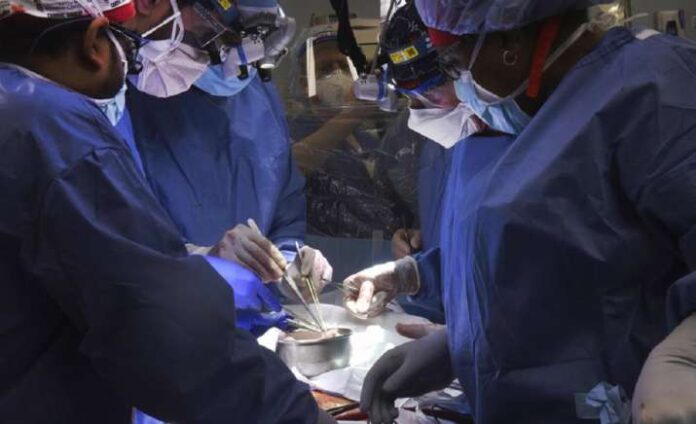| Translate This News In |
|---|
In a last-ditch effort to save a patient’s life, doctors transplanted a pig heart into him, and three days later, a Maryland hospital reported that he was doing well.
While it’s too early to tell if the procedure will work, it’s a significant step forward in the decades-long quest to use animal organs for life-saving transplants. The transplant proved that a heart from a genetically modified animal may work in the human body without rapid rejection, according to doctors at the University of Maryland Medical Center.
The patient, David Bennett, a 57-year-old Maryland handyman, was aware that the experiment had no promise of success, but he was dying, ineligible for a human heart transplant, and had no other choice, according to his son.
“I had to choose between dying and undergoing this transplant.” I’d like to continue living. According to a statement released by the University of Maryland School of Medicine, Bennett said the day before the surgery, “I know it’s a gamble, but it’s my last resort.”
Bennett was breathing normally on Monday, despite the fact that he was still hooked up to a heart-lung machine to assist his new heart. Bennett’s recovery from surgery and physicians’ cautious monitoring of his heart’s condition will be crucial during the next few weeks.
Because there is a severe shortage of human organs available for transplant, doctors are experimenting with animal organs. According to the United Network for Organ Sharing, which supervises the nation’s transplant system, there were slightly over 3,800 heart transplants in the United States last year, a record high.
“If this works, there would be an unlimited supply of these organs for people in need,” Dr. Muhammad Mohiuddin, scientific director of the Maryland university’s animal-to-human transplant programme, said.
However, previous attempts at such transplants — known as xenotransplantation — have failed, owing to the fact that the animal organ was quickly rejected by the patients’ bodies. In 1984, a dying baby named Baby Fae was given a baboon heart and lived for 21 days.
The difference this time was that the Maryland surgeons utilised a pig’s heart that had been gene-edited to remove the sugar in its cells that causes the organ rejection to happen so quickly. Several biotech firms are working on pig organs for human transplantation; the one used in Friday’s procedure came from Revivicor, a United Therapeutics subsidiary.
Dr. David Klassen, UNOS’ senior medical officer, described the Maryland transplant as “a milestone event.”
Klassen emphasised, however, that this is merely the first stage in determining whether xenotransplantation will work this time around.
The procedure was permitted by the Food and Drug Administration under a “compassionate use” emergency authorisation, which is accessible when a patient with a life-threatening ailment has no other options.
Karen Maschke, a research scholar at the Hastings Center who is assisting in the development of ethics and policy recommendations for the first clinical trials under a grant from the National Institutes of Health, said it will be critical to share the data gathered from this transplant before it is expanded to more patients.
Scientists have tinkered with the genes of pigs rather than monkeys over the years.
In a statement, he remarked, “This is a genuinely spectacular breakthrough.” “As a heart transplant recipient who also has a genetic cardiac condition, I am overjoyed by this news and the hope it provides for my family and other patients who will benefit from this discovery.”
Before providing the opportunity to Bennett, Griffith had implanted pig hearts into around 50 baboons over the course of five years.
Pig heart valves have been used effectively in people for decades, according to Bennett’s son, who said his father acquired one roughly ten years ago.
“He appreciates the significance of what was done and he really understands the value of it,” David Bennett Jr. said of the heart transplant. “He might not live, or he might live for a day, or he might live for a few of days. We’re in the middle of nowhere right now.”


















